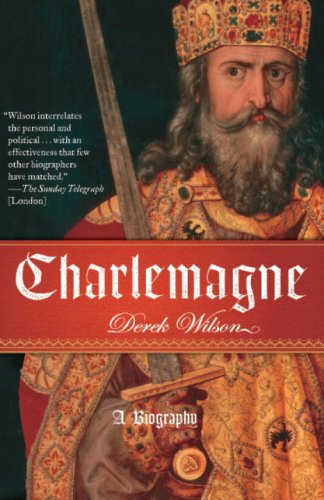This summer seemed a good idea to fill in some details.
In possession of a gift certificate, off to the Strand I went, certain there would be shelves of books in the European section on these matters. Well, no. Feudalism in France, there were many, many books, all of which began with a short introduction that explained what we already know: that structural roots of what is understood as pure feudalism began with Charlemagne's administrative organization of his own empire, for taxes, for defense and law-giving. Feudalism is FRENCH in origin. Well, yah, we know that.
Derek Wilson's Charlemagne (2016) was only book in the whole enormous place that had Charlemagne as the subject, front and center. Charlemagne, by Brit popular historian, Derek Wilson, who specializes in biographies of colorful monarchs for trade - commercial publishing, not academic. The books are dense with information, though they are on the prestige end -- not quite coffee table books, but have full-color, beautiful art reproduced to illustrate. It was first published in England (Hutchinson Press). Doubleday reprinted here, but as I said, this isn't a subject of interest to U.S. trade publishing.
My reasons for reading Charlemagne (2006) by Derek Wilson were many.. Most of them were not satisfied, for reasons of length (it's short) for reasons that the work was more geared to dealing with what seems to have been Charlemagne's character.
However, Wilson's book did reveal something important to me, both personally and for the project in which I am currently engaged. Wilson, methodically, providing excellent sources throughout, debunked the mythology which is what almost all of us know about this first western Roman emperor. In other words almost everything we think we know about him, no matter how little we know we know, is false -- phony history, deliberately constructed as PR both in his own time and later, for all sorts of reasons. Best of all, Wilson describes how Charlemagne himself, his scribes and advisors, and those who followed them, employed minstrels / singers / poets to do this.
Another way of putting it is that these powerful elites engaged in deliberate revision of history for the purpose of convincing those over whom they ruled that things that were not, were, and what had happened, didn't happen.
 |
| My copy, acquired for Senior Honors Comp. Lit course. |
All of the purposes for which popular culture was deployed to change history find their nexus, naturally, in La Chanson de Roland.
For purposes of brevity, cut to the chase:
Q: Why was Charlemagne in Spain and the borders of the Gaulish provinces in the first place?
A: To keep the Moors from invading Christian Gaul.
Well, no.
At that time the Abbasid Caliphate had prevailed over much of the strict religious Umyyad Caliphate, Iberia -- Spain, the western edge of the Muslim world was much divided, with the Umyyads under siege by the Abbasid factions. (There were other splinter groups as well within Islamic Spain, just as there were splinter groups among the precariously hanging on Christians in northwestern Spain. One of the Umyyad groups invited (with money payment as a carrot) Charlemagne and his forces to come and help them against the largest Abbsid group. And he did. That's what he and his forces were where they were -- not fight Saracens, but helping one group of Saracens against another group.
The interpenetration of Muslims in Charlemagne's kingdom was so common in terms of living, trade, marriage that everyone pretty much got along -- particularly for the sake of trade and taxes.
Bet this hadn't been heard by most of us before, who aren't actual scholars of the era and read the languages of the documents . . . .
But the rep of Charlemagne as Christ's Defender of the Faith, who held off the defeat of Europe's heart by the Spanish Saracens holds to this day. As to a somewhat lesser degree, does Charlemagne's great efforts in taking Jerusalem from the Saracens. Not true, he never went there, of course.
Mostly he fought other Christian warlords, while all fought with each other, and maneuvered, most often with military might, to overcome his warlord, rivals -- and not infrequently even the Pope himself (who wasn't in Rome at this period). But Charlemagne had greater vision than all of them.
This is where he and the western Church came together. Charlemagne had more than glimmers of Christiandom -- which could be viewed as a spiritual version of the Eurozone. However many bastards he sired, etc., Charlemagne's faith and belief in Christianity and the Church were as deep as his drive to power and control, and both were equally sincere.
He divided his kingdom for the sake of peace in his later years. None of his heirs had his faith, his talents or charisma, and what he built fell apart quickly (rather like what seems is happening with the Eurozone?)
 |
| Leo III crowns Charlemagne emperor. |
For his time and place, the scope of his vision of Christendom was exceptional. It became a dream ideal, a foundation of the equally dream ideal of Chivalry, that all of those west of the Adriatic were part of something that was unto itself -- special, under God's and Christ's particular, protection and affection. Which drove crusades and other incursions unto this very day. Charlemagne's empire was the foundation of what later became the Holy Roman Empire, often more an idea or a claim than an empire at all. But it lasted until WWI finally put it forever in its well-earned coffin.
I understand rather better now why Charlemagne is the patron saint of the very idea of Europe, even though much of his sainthood is founded in faux deeds and deliberately created romance.
I still am unable to outline all the steps along the way though, from the 5th century through that of the 11th.




No comments:
Post a Comment